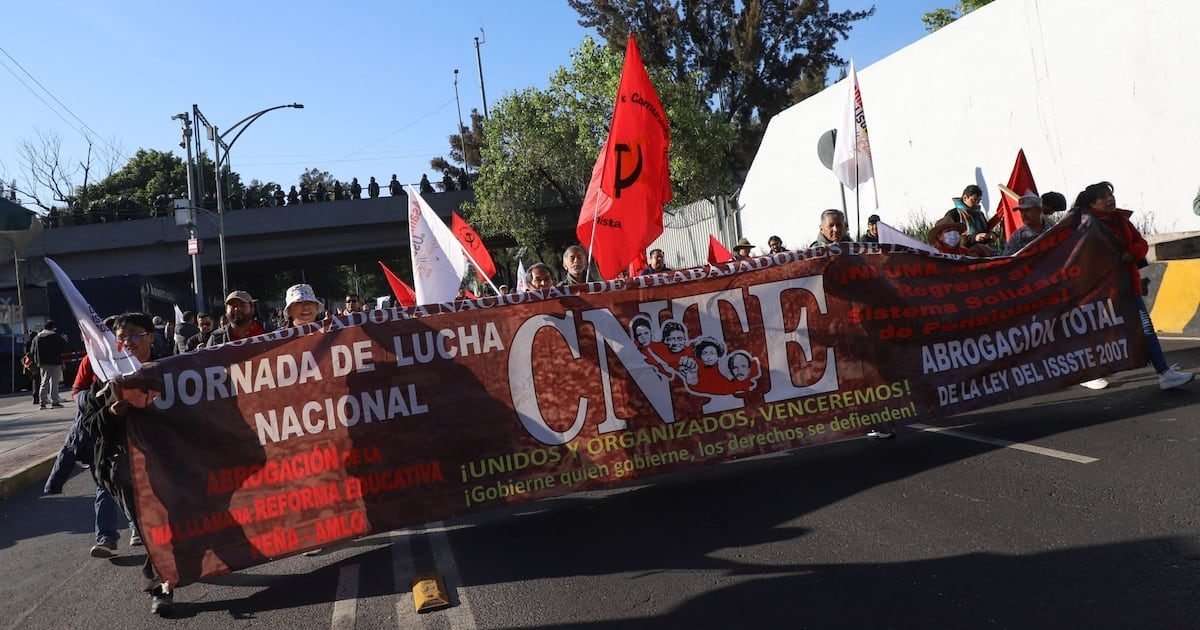Mexico City — Chants of "There will be no World Cup! There will be no World Cup!" echoed through the streets this week as members of the dissident National Coordinator of Education Workers (CNTE) teachers' union marched in protest. The union has threatened to install a national sit-in if President Claudia Sheinbaum does not respond to their demands, which include the repeal of educational and social security reforms and calls for better salary conditions and pensions.
The teachers' march coincided with the official presentation of the 2026 FIFA World Cup. "It is a moment not only to see the best football, but also to show the world who we are, what Mexico is," President Sheinbaum emphasized during the event at the former presidential residence of Los Pinos.
With just seven months until the inaugural match, an inevitable question arises: What image will the international community take away from Mexico? This is a concern well understood by the CNTE teachers, by farmers angered by the prices of their crops, by populations like Uruapan that feel unprotected against organized crime, by the Searching Mothers who watch in horror as the country has experienced its year with the most disappearances, by doctors and patients protesting the lack of resources, and by judges and magistrates who have not been compensated as agreed.
Adding to this landscape of social discontent and anger is the emergence of the "Generation Z" movement in Mexico: a youth collective (young people between 13 and 28 years old) born on social media platforms like Discord, Instagram, and TikTok, which organizes national marches to protest against insecurity, corruption, and other injustices.
The FIFA representative in Mexico, Jurgen Mainka, assured attendees alongside President Sheinbaum that they have worked with different levels of government over the last three years. "We are very sure, very confident that the protocols and all the plans being implemented for the World Cup will provide the security framework for all fans, teams, and referees in 2026," Mainka stated.
However, for an international event of this magnitude, organizers are concerned about potential terrorist attacks, assaults on national and foreign officials and VIPs, cyber disruptions and hacking that could affect critical infrastructure like the electrical and internet grids, in addition to blockades at airports and main highways. The protocols also include the host country's capacity to react to natural and anthropogenic disasters.
Analyzing recent disasters, there will surely be questions about the structures and capabilities of the Mexican government. The tragedy of the gas tanker that exploded in Mexico City in September, killing at least 32 people, is cited as an example of the weaknesses in emergency response. The positive news is that these incapacities could be resolved in the short term with an adequate injection of resources and training.
Regarding potential attacks, these can also be mitigated with excellent international coordination, intelligence, and resources. But this requires confidence in Mexican authorities, at a time when the relationship with the United States is showing fissures.
Yet, there is one factor that could have a catastrophic impact on Mexico's image: the violence exercised by "terrorist" criminal organizations and the outbreaks of ungovernability that could arise from mass protests by unions, civil organizations, and social movements. This is a problem that FIFA cannot solve.
It appears that Mexico is running out of time. Consequently, it is unsurprising, given the reality of violence in the country, that rumors have emerged suggesting that Donald Trump would want to take the opening ceremony away from Mexico.
The government faces a dilemma with organized crime and its ability to influence the World Cup, either through violence or by seeking political advantage from the event. Having not resolved this problem in previous years, it will now have to implement a confrontation strategy to mitigate the capabilities of these criminal organizations in the short term. This will almost certainly increase violence.
As for social protests, President Sheinbaum knows well that protesting before an international event is not a new strategy. The most dramatic example was the student protests and massacres weeks before the 1968 Olympics. All these organizations know they have seven months to pressure the Mexican government; otherwise, their demands will never be heard or addressed. The incentive is clear: to exert disruption and extreme violence.
Before accusing the opposition or attempting to minimize the credibility of the protesters, it would be a good time for the government of Mexico to listen. The president should also look to the left and see if the sabotage is coming from friendly fire.
Discover more from Riviera Maya News & Events
Subscribe to get the latest posts sent to your email.
